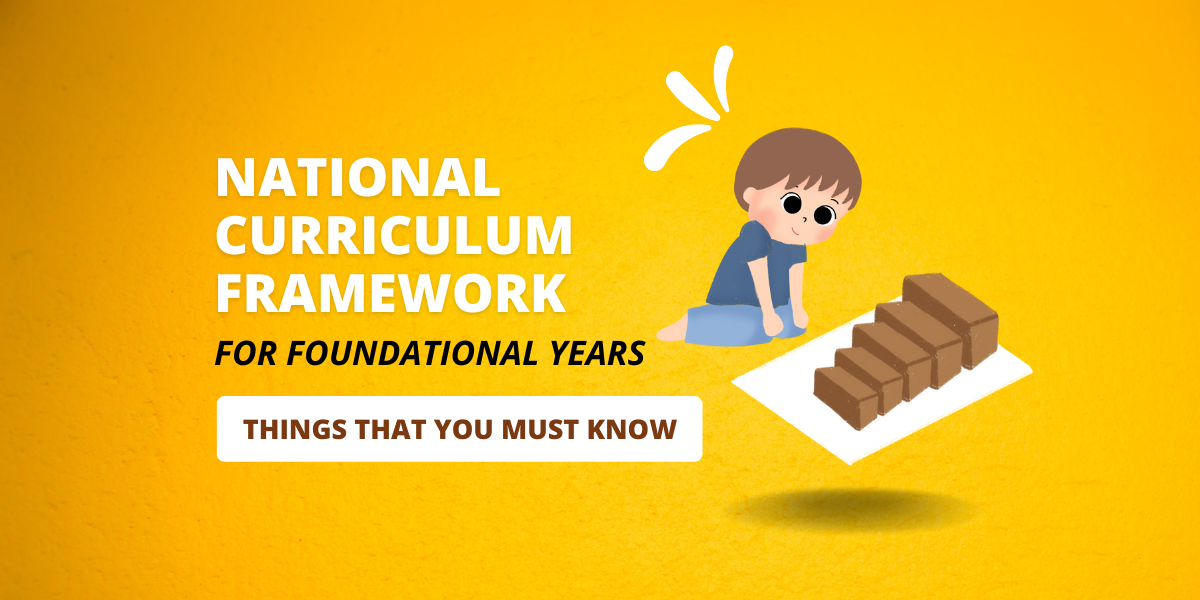
National Curriculum Framework (NCF) for foundational stage education of children: Things that you need to know
Your child is about to be three-year-old and you as parents have started looking for a school providing foundational stage education. You must be wondering as to what are the parameters that you should look out for in a school. Let us tell you that you should look for an institution aligned with the New Education Policy (NEP) 2020. Therefore, the first question you should ask is: “Is it NEP ready?” There could also be an easier way to know this! Read on.
In case you are wondering about the relevance of the NEP for a kid who has just come out of her crib, please note that the new education policy sets a huge store by overhauling the entire education system in a manner so that children start to think for themselves from the earliest stage of their schooling. And that stage starts at your child’s preschool days! We will discuss NEP in a separate blog but let us quote one part from NEP 2020 to indicate the focus of the policy. It says:
- “priority to achieving Foundational Literacy and Numeracy by all students by Grade 3;
- Flexibility, so that learners have the ability to choose their learning trajectories and programmes, and thereby choose their own paths in life according to their talents and interests;”
The National Curriculum Framework (NCF) 2022
To achieve the objectives of the NEP, the curriculum framework has been overhauled. Recognising that 85 per cent of the cumulative brain develops by age 8 the new policy says, “The Foundational Stage will consist of five years of flexible, multilevel, play/activity-based learning and the curriculum and pedagogy of ECCE (Early Childhood Care and Education). The Preparatory Stage will comprise three years of education building on the play, discovery, and activity-based pedagogical and curricular style of the Foundational Stage, and will also begin to incorporate some light text books as well as aspects of more formal but interactive classroom learning, in order to lay a solid groundwork across subjects, including reading, writing, speaking, physical education, art, languages, science, and mathematics.”
The NCF-2022 it will not be out of place to add, has four sections – the National Curriculum Framework for School Education, the National Curriculum Framework for Early Childhood Care and Education, the National Curriculum Framework for Teacher Education, and the National Curriculum Framework for Adult Education. The framework draws its intellectual sustenance from the timeless “panchakosha” a non-dichotomous approach to human development – the five essential parts being physical (sharirik), emotional (manasik), intellectual (bauddik), spiritual (chaitsik) and life energy (pranik) development.
The policy, therefore, wants easily accessible, high-quality early childhood education in step with its policy objectives. It is a proven fact and as has been reiterated in the policy, that brain development is most pronounced in the first eight years of a child’s life, which requires systematic administration of cognitive and socio-emotional stimulation. The launching of the National Curriculum Framework (NCF) for foundational stage education of children in the three to eight years age group in India is therefore being hailed as a monumental step that, if implemented properly, can be a game-changer for early childhood education.
But more importantly for the stakeholders within the NCF 22 is to be NEP-ready guided by NCF 22. And parents should search out NCF-ready institutions so that the transition to the next level for their wards is not bumpy.
Nalanda Learning System and NCF
Having recognized the need for creating new teaching tools as laid out in the NEP 2020, Nalanda went cracking and is ready with the pedagogy that is in sync with all four branches of NCF 22. It has all the material and teaching aids that have been painstakingly developed to address emerging needs as per the NCF 22. So, for all schools powered by the Nalanda system will also be NEP-ready and NCF-compliant.
The new policy initiative, incidentally, is a vindication of sorts for Nalanda Learning Systems Pvt Limited astutely led by led by Tamal and Timir Mukherjee, which enjoys a virtual prime mover status in the segment, providing a 360-degree solution that empowers pre-schools to deliver a NEP 2020 recommended curriculum backed by technology, training, and expert advice. An area in which it has been tirelessly working for close to a decade now.
So, parents, instead of asking whether it is NEP-ready, you may simply ask whether the school is powered by the Nalanda system.